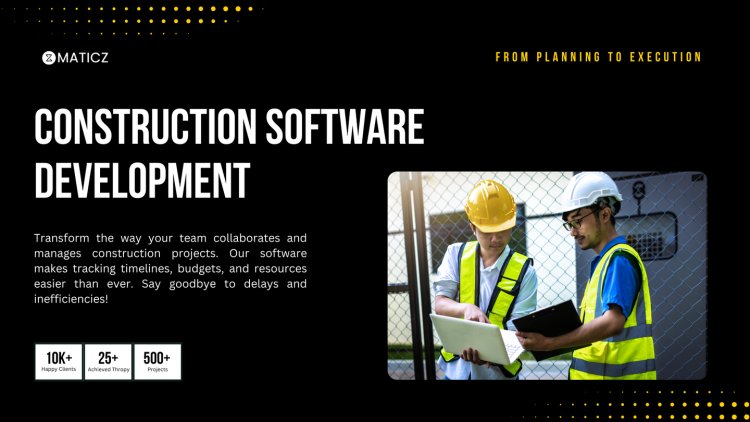How AI & Machine Learning Are Transforming Construction Software
Discover how AI and machine learning are transforming modern construction software, enhancing efficiency, safety, and project management in the industry.

The construction industry has witnessed a significant digital revolution in recent years, with Artificial Intelligence (AI) and Machine Learning (ML) playing a pivotal role in reshaping how projects are planned, executed, and managed. From optimizing resource allocation to improving safety and efficiency, AI-driven construction software is making construction smarter, faster, and more cost-effective.
Enhancing Project Planning and Design
AI and ML algorithms are revolutionizing project planning by enabling predictive analytics and intelligent decision-making. With AI-powered Building Information Modeling (BIM), architects and engineers can generate data-driven designs that minimize errors, reduce waste, and optimize space utilization. ML models can analyze past project data to predict potential delays, allowing teams to mitigate risks before they arise.
Additionally, AI-powered generative design enables construction teams to explore multiple design alternatives within minutes, ensuring the most efficient and sustainable solutions are chosen. These advancements significantly improve project feasibility assessments, reducing costs and increasing efficiency from the outset.
Improving Jobsite Productivity
One of the most impactful applications of AI in construction software is its ability to boost productivity. AI-driven scheduling tools analyze workforce availability, project deadlines, and material logistics to create optimized project timelines. This minimizes downtime and ensures smooth coordination between teams.
Construction robotics, powered by AI, are also playing an essential role in automating repetitive tasks such as bricklaying, excavation, and material handling. By handling these labor-intensive processes, AI allows human workers to focus on more complex, high-value tasks, ultimately improving overall efficiency.
Enhancing Safety and Risk Management
Workplace safety remains a top priority in the construction industry, and AI is proving to be a game-changer in this area. AI-powered computer vision systems can analyze real-time jobsite footage to detect safety hazards, such as workers not wearing protective gear or unsafe equipment usage. Instant alerts help supervisors take immediate action, preventing accidents before they occur.
Moreover, ML algorithms can analyze historical safety data to predict potential hazards, allowing construction managers to implement proactive measures. Wearable AI devices and sensors further enhance safety by monitoring workers' vitals and detecting fatigue, ensuring a safer work environment for all.
Optimizing Resource and Cost Management
AI-driven construction software is revolutionizing resource management by providing accurate material forecasting and cost estimation. Predictive analytics help contractors procure the right amount of materials, reducing wastage and unnecessary expenses. AI-powered procurement platforms also streamline supplier selection, ensuring the best materials are sourced at competitive prices.
Additionally, AI-based cost control systems track budget spending in real time, identifying potential overruns before they escalate. With smarter financial management, construction firms can maximize profitability while delivering high-quality projects on time.
Enabling Smart Construction with IoT and Automation
AI and IoT (Internet of Things) are working hand in hand to create "smart construction" environments. IoT-enabled sensors, combined with AI analytics, provide real-time insights into equipment performance, structural integrity, and environmental conditions. This data-driven approach allows for predictive maintenance, reducing unexpected breakdowns and extending the lifespan of machinery.
Furthermore, AI-powered drones are transforming site inspections by capturing high-resolution aerial images and detecting structural issues with greater accuracy than manual inspections. These advancements are making construction software development more dynamic, helping businesses embrace automation and increase overall project efficiency.
Conclusion
The integration of AI and Machine Learning in construction software is revolutionizing the industry, making projects safer, more efficient, and cost-effective. From intelligent project planning and real-time risk management to smart automation and enhanced resource allocation, AI is driving a new era of innovation in construction. As technology continues to advance, AI-driven solutions will become even more sophisticated, empowering construction firms to build smarter, faster, and more sustainably than ever before.
What's Your Reaction?






















